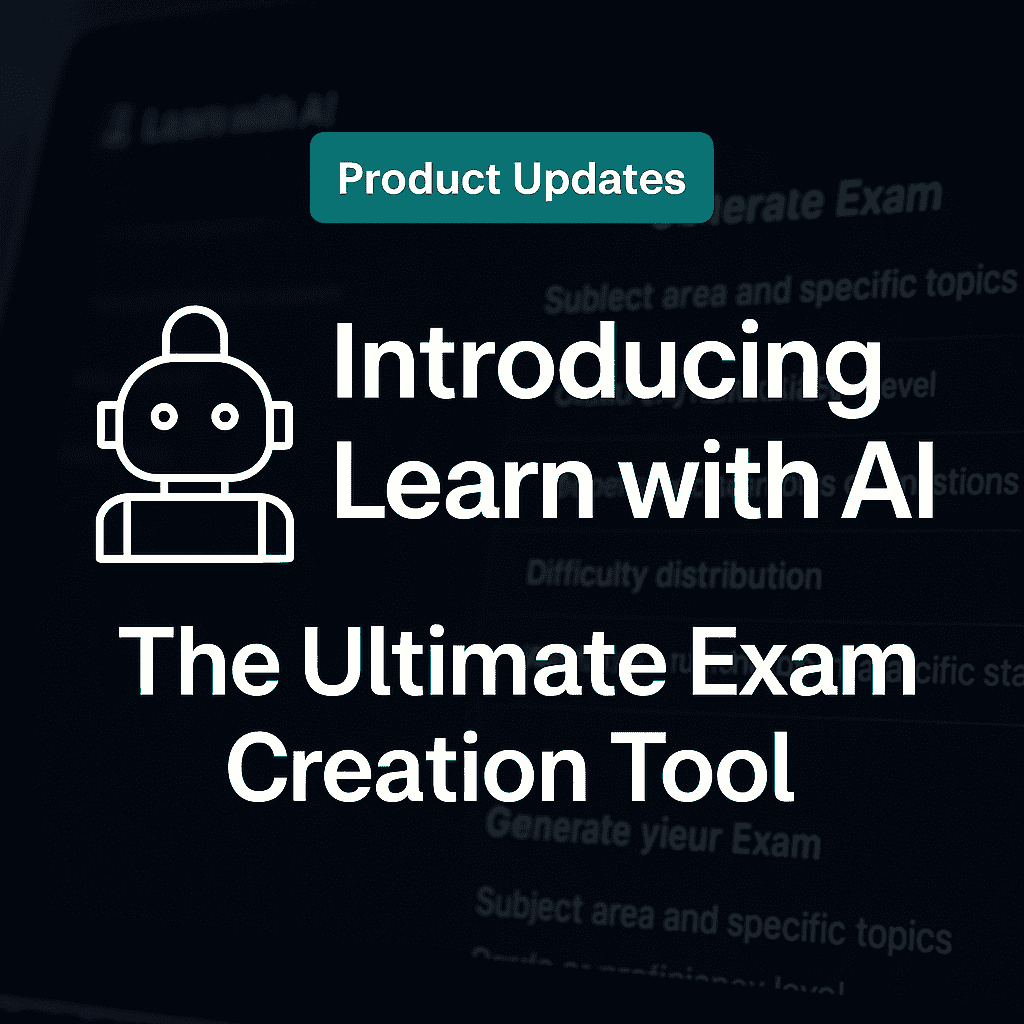
The Future of Education: AI, Machine Learning, and Beyond

Dr. Sophia Chang
April 2, 2025 • 9 min read
Education is on the cusp of a profound transformation, driven by advances in artificial intelligence and machine learning. As we look toward the next decade, these technologies promise to revolutionize how we teach, learn, and assess knowledge. This article explores the emerging trends that will shape education's AI-powered future.
The Educational AI Landscape in 2025
We're already witnessing significant adoption of AI in education. Learning management systems use predictive analytics to identify at-risk students. Adaptive learning platforms personalize content based on individual progress. AI-powered tutoring assistants provide after-hours support to students.
But these applications represent just the beginning of what's possible. As we move further into the decade, several key trends will dramatically expand the role of AI in education.
Trend 1: Hyper-Personalized Learning Experiences
Today's adaptive learning systems can adjust difficulty levels and suggest remedial content. Tomorrow's systems will be far more sophisticated, creating truly individualized learning journeys:
AI-Driven Learning Profiles
Future AI systems will develop comprehensive learning profiles for each student that go far beyond academic performance:
- •Cognitive strengths and challenges across different domains
- •Preferred learning modalities (visual, auditory, kinesthetic, etc.)
- •Optimal pacing for different types of content
- •Emotional states and their impact on learning performance
- •Knowledge connection patterns and conceptual understanding
These profiles will continuously evolve as the AI gathers more data, becoming increasingly accurate in predicting what approaches will be most effective for each learner.
Content Generation and Adaptation
Beyond simply curating existing materials, AI will dynamically generate new, personalized learning content:
- •Custom examples that connect to a student's interests and background
- •Explanations crafted to match individual conceptual frameworks
- •Practice exercises that target specific growth areas
- •Multimodal presentations that align with learning preferences
A student struggling with algebra might receive problems contextualized within their interest in music, while another might see the same concepts applied to sports statistics—all generated in real-time by AI systems.
Trend 2: AI Teaching Assistants and Tutoring Systems
Current AI tutors can answer questions and provide basic feedback. Future systems will become sophisticated teaching partners with deeper capabilities:
Conversational AI Tutors
Next-generation AI tutors will engage in natural, Socratic dialogues that probe student understanding and guide discovery:
- •Identifying conceptual misunderstandings through conversation
- •Adapting questioning strategies based on student responses
- •Providing scaffolded guidance that gradually fades as mastery increases
- •Engaging students in metacognitive reflection about their learning process
These systems will move beyond simple Q&A to become true thinking partners for students, capable of challenging assumptions and fostering deeper reasoning.
Emotional Intelligence in AI Education
Perhaps most significantly, future educational AI will incorporate emotional intelligence:
- •Detecting frustration, confusion, boredom, or engagement through facial expressions, voice patterns, and interaction data
- •Responding appropriately to emotional states—offering encouragement, breaks, or changes in approach
- •Building rapport with students through personalized interactions
- •Helping students develop emotional regulation and resilience
This emotional awareness will address a major limitation of current systems, which can feel mechanical and unresponsive to the human aspects of learning.
Trend 3: Reimagined Assessment through AI
Traditional assessment methods—standardized tests, written exams, multiple-choice quizzes—are ripe for disruption through AI technologies:
Continuous, Invisible Assessment
Rather than relying on periodic tests, AI systems will continuously evaluate understanding:
- •Analyzing patterns in student responses during natural learning activities
- •Building knowledge graphs that represent student understanding across domains
- •Identifying misconceptions and knowledge gaps without formal testing
- •Tracking growth trajectories with sophisticated statistical models
This approach makes assessment an organic part of the learning process rather than a separate, potentially stressful event.
Authentic Performance Evaluation
AI will enable practical assessment of complex skills in authentic contexts:
- •Evaluating problem-solving approaches through process analysis
- •Assessing collaboration skills in group projects
- •Measuring creativity and innovation in open-ended tasks
- •Providing multidimensional feedback on complex performances
For example, a student's solution to an engineering challenge might be analyzed not just for correctness, but for efficiency, creativity, practicality, and adherence to constraints—all evaluated by AI in real-time.
The Future of Assessment is Here
Learn with AI is at the forefront of AI-powered assessment technology. Our platform leverages machine learning to create intelligent, adaptive assessments that measure deeper understanding.
Experience the Future TodayTrend 4: AI-Enhanced Teachers, Not AI-Replaced Teachers
Despite fears of automation, the most promising future isn't one where AI replaces educators, but one where it amplifies their capabilities:
AI as Teacher Amplifier
Future classroom AI will serve as powerful assistants to human teachers:
- •Handling routine tasks like grading, attendance, and basic content delivery
- •Providing real-time analytics on student engagement and comprehension
- •Suggesting differentiation strategies for diverse learners
- •Generating customized resources based on teacher objectives
This partnership will free teachers to focus on what humans do best: inspiring students, providing emotional support, fostering social skills, and guiding higher-order thinking.
AI-Powered Professional Development
Teachers themselves will benefit from AI-driven learning:
- •Personalized coaching based on classroom observation data
- •Virtual simulation environments to practice new teaching strategies
- •Recommendation systems for professional learning resources
- •Collaboration tools that connect educators with similar challenges
As students receive more personalized learning, teachers too will enjoy more customized professional growth opportunities.
Trend 5: Addressing AI's Challenges in Education
While the potential is enormous, the expansion of AI in education brings significant challenges that must be addressed:
Ensuring Ethical AI Use
Educational AI systems must be developed with clear ethical frameworks:
- •Transparent algorithms that can be inspected for bias
- •Strong data privacy protections, especially for minor students
- •Inclusion of diverse perspectives in AI development
- •Regular ethical audits of educational AI systems
Industry standards and regulatory frameworks will likely emerge to govern these issues as AI becomes more pervasive in education.
Bridging the AI Divide
Ensuring equitable access to AI educational benefits will be crucial:
- •Developing low-bandwidth and offline AI capabilities for regions with limited connectivity
- •Creating multilingual AI systems that serve non-English speakers
- •Designing interfaces that work for users with disabilities
- •Providing affordable access models for advanced educational AI
Without deliberate effort, AI could widen educational divides rather than narrow them—making equity considerations paramount as these technologies develop.
The Road Ahead: Preparing for Education's AI Future
How can educational institutions, teachers, and learners prepare for this rapidly approaching future?
For Educational Institutions
- •Develop clear AI strategies and implementation roadmaps
- •Invest in digital infrastructure to support advanced AI applications
- •Create data governance frameworks that enable AI while protecting privacy
- •Provide professional development to help educators work effectively with AI
For Teachers
- •Focus on developing the uniquely human aspects of teaching that AI cannot replicate
- •Learn to effectively integrate AI tools into pedagogical practice
- •Advocate for AI systems that support rather than constrain teaching philosophy
- •Participate in the design and evaluation of educational AI
For Students and Parents
- •Develop digital literacy skills to effectively utilize AI learning tools
- •Maintain a balance between AI-supported learning and human connection
- •Provide feedback on AI educational experiences to drive improvement
- •Advocate for ethical, equitable AI systems in schools
Conclusion: A Collaborative Human-AI Future
The most inspiring vision of education's future isn't one dominated by AI, but one where artificial intelligence and human intelligence work in concert, each doing what it does best. AI can process vast amounts of data, personalize experiences at scale, and provide instant feedback. Humans bring creativity, ethical judgment, emotional connection, and wisdom.
Together, these complementary strengths have the potential to create educational experiences more powerful than either could achieve alone—helping each learner reach their full potential while preserving the fundamentally human aspects of education that give it meaning and purpose.
The future of education isn't just about smarter machines—it's about how those machines can help us become smarter, more compassionate, and more capable humans.

Dr. Sophia Chang
Dr. Sophia Chang is an educational researcher specializing in AI applications for learning. Previously the director of learning sciences at a major edtech company, she now consults with educational institutions on implementing effective personalized learning systems. She holds a Ph.D. in Learning Analytics from Stanford University.
Related Articles
 EdTech Trends
EdTech TrendsHow AI is Revolutionizing Education in 2025
Discover the transformative impact of artificial intelligence on modern education and how it's reshaping teaching and learning experiences.
 EdTech Trends
EdTech TrendsPersonalized Learning: Tailoring Education with AI
Explore how artificial intelligence is enabling truly personalized learning experiences that adapt to individual student needs.
 Product Updates
Product UpdatesIntroducing Learn with AI: The Ultimate Exam Creation Tool
Get to know our powerful AI-driven platform that's helping educators create customized, high-quality assessments in minutes instead of hours.